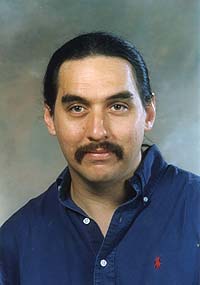|
June 28, 2004
Florida voting problems fit historical pattern,
says voting rights expert
By Jennifer McNulty
As the nation gears up for the November election, voting rights specialist
Paul Ortiz is bracing for a replay of the 2000 Florida debacle.
|

Paul Ortiz's new book documents the bloodiest Election Day in
modern American history. Photo: Victor
Schiffrin, UCSC Photo Services
|
Ortiz, an assistant professor of community studies, says the voting
“irregularities” that disenfranchised thousands of African
American voters in Florida were not an isolated phenomenon.
“The focus has been on Florida, but investigators have found irregularities
across the nation,” said Ortiz, author of the forthcoming book,
Emancipation Betrayed: The Hidden History of Black Organizing and
White Violence in Florida from Reconstruction to the Bloody Election
of 1920, which will be published next year by the University of
California Press.
Ortiz’s book documents the first statewide civil rights movement
against Jim Crow and culminates with a description of the 1920 election
when white supremacists and the Ku Klux Klan violently--and with state
sanction--prevented African Americans from voting. It was the bloodiest
Election Day in modern U.S. history.
The legacy of legal segregation was evident in North Carolina in 2000,
where more than 100,000 ballots were lost primarily in the state’s
eastern “plantation counties,” said Ortiz, who was living
in North Carolina in spring 2001 when calls began coming in from journalists.
“This really matters, because it affects the validity of the whole
system,” said Ortiz. “If you can’t control the system
of elections, you don’t have much of a democracy. If my vote might
be counted out, where’s my representation?”
Blacks have gained and lost the right to vote several times throughout
U.S. history, noted Ortiz. “There is a pattern of disenfranchising
blacks, although the methods change,” he said. In 1920, the state
sanctioned violence against Florida voters. Four years ago, the state’s
election machinery was run by people who were “very committed to
tightening the system of voting to exclude as many black people as possible
without openly violating the law,” said Ortiz.
According to testimony before the Civil Rights Commission regarding
the 2000 election in Florida, the posting of state troopers outside
polling stations in predominantly black precincts intimidated many would-be
voters. Others were put off by volunteers who asked questions about
the criminal history of voters. In other parts of the country, including
the western United States, failure to distribute sample ballots in Spanish
or Chinese similarly restricts the rights of voters, added Ortiz.
A growing number of states have adopted computerized voting systems
since Congress passed the Help America Vote Act of 2002, and Ortiz is
bracing for their first big test: the November presidential election.
“One election doesn’t give us a trend, but if 2004 unfolds
in a similar manner, it will pose the gravest danger to our democracy,”
he said. “We’ve seen a steady decline in voter turnout, and
the biggest risk is that even more people will get the message that
their vote doesn’t count, and they’ll opt out of the system.”
Return to Front Page
|